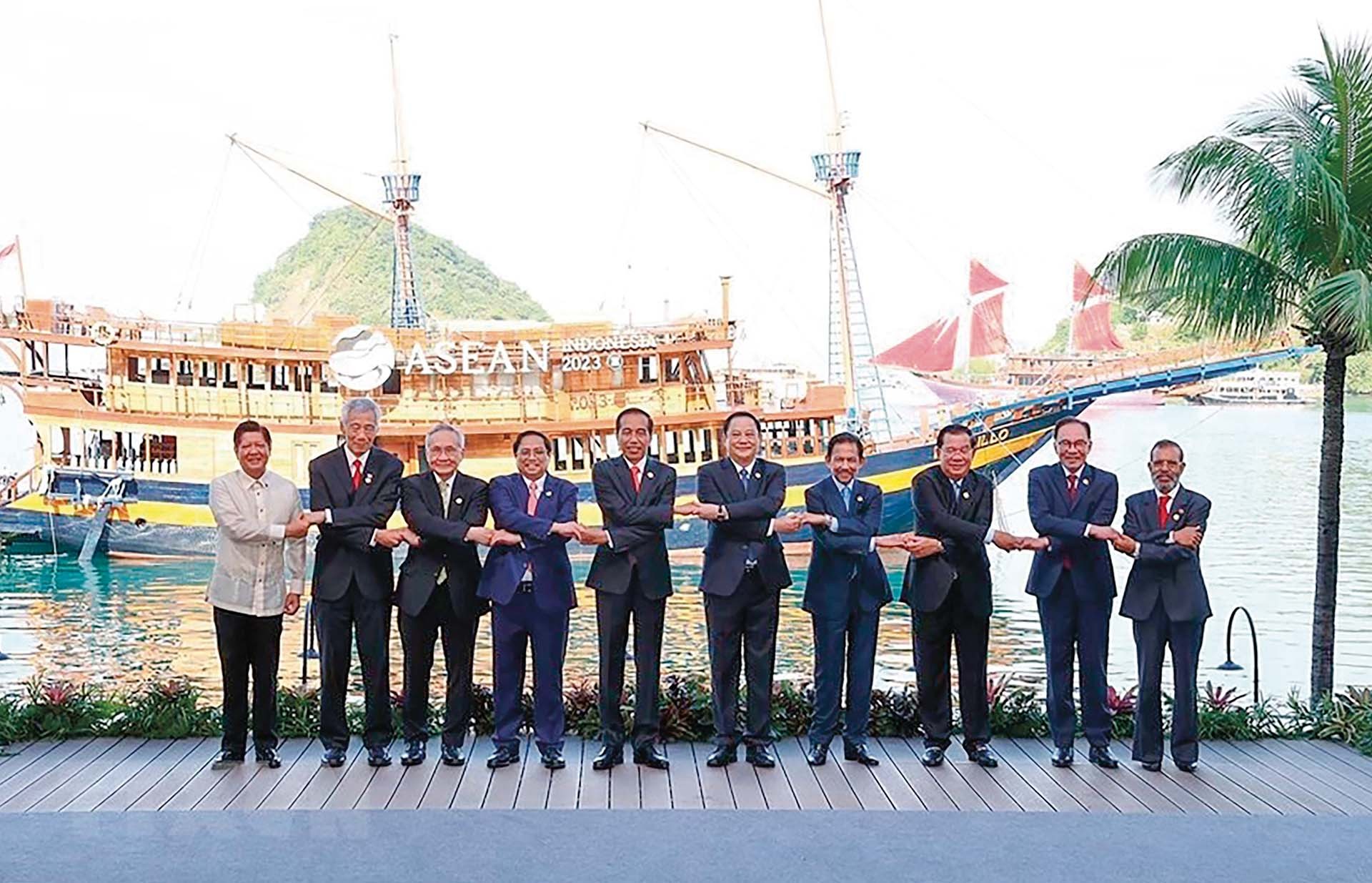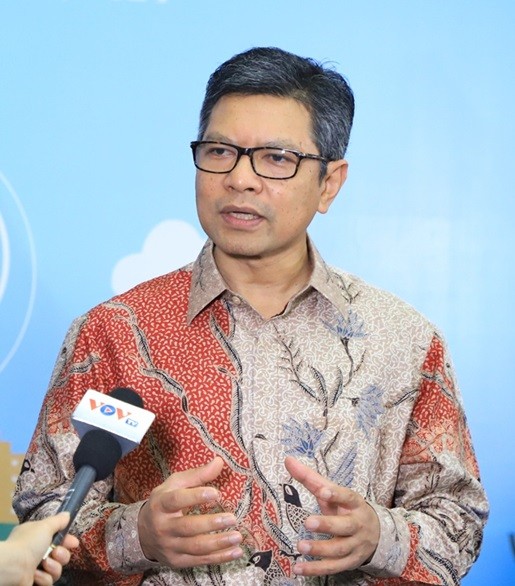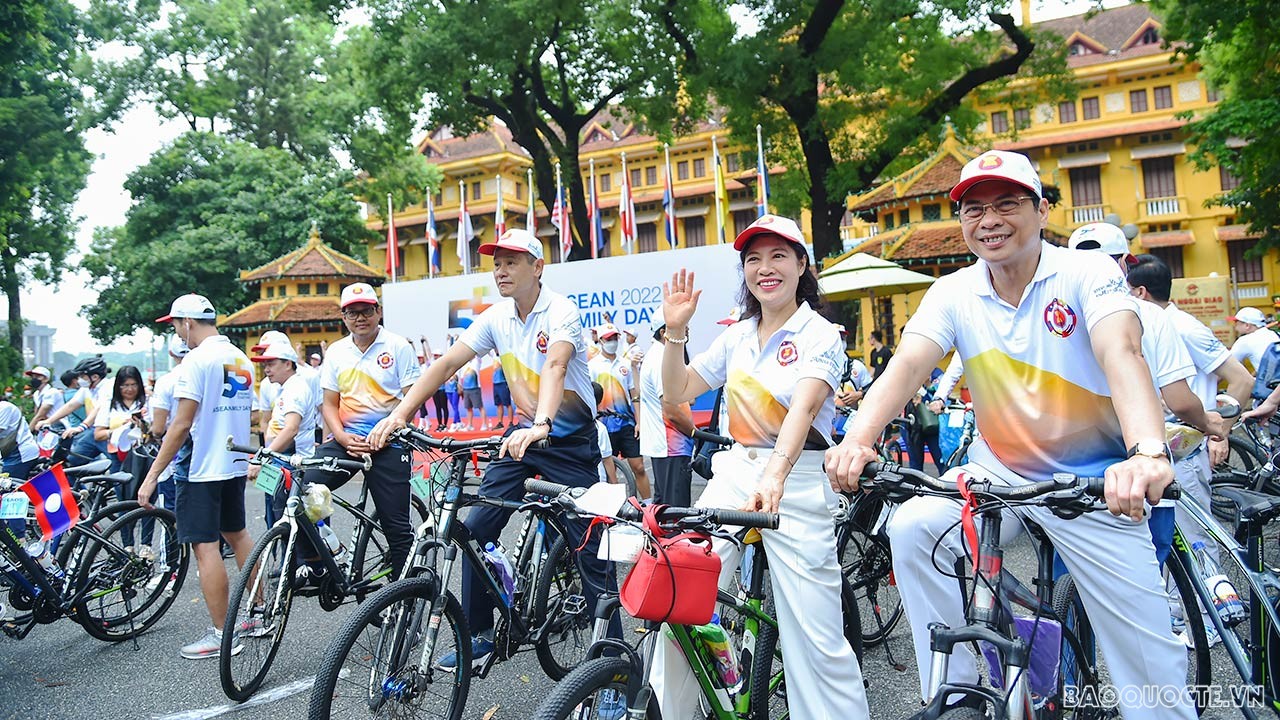
ASEAN must develop resilience and adapt to evolving challenges: Indonesian Ambassador Denny Abdi
Latest
 |
| Leaders of ASEAN member states to the 42nd ASEAN Summit in Labuan Bajo, Indonesia, 5/2023. (Photo: Tuấn Anh) |
Living at the heart of this interchange
The ASEAN Future Forum was announced by Prime Minister Pham Minh Chinh during the ASEAN Summit in Jakarta, September 2023. The forum was intended to further exchange ideas and initiatives for cooperation that can contribute to the rapid, sustainable, and people-centered development in the region.
This initiative is very timely because the world is getting more complex and the challenges today are quite different than 10-years ago.
 |
| Indonesian Ambassador to Vietnam Denny Abdi. (Photo: PA) |
Rivalries among great powers have become more intense and economic projections are uncertain. There are conflicts in Ukraine and Middle East that create great humanitarian concerns, along with issues of migration and displaced persons. Climate change, impacts from COVID-19 pandemic, and weather crisis also present disruption to global food security and other socio-economic consequences.
On the other hand, we are experiencing rapid development of high-technology, digital, AI, cyber, that call for greater multi-dimensional collaboration. In Southeast Asia, we are dealing with the situation in Myanmar, South China Sea, and dynamics in the Indo-Pacific region.
ASEAN members live at the heart of this interchange. That is why, ASEAN’s ability to manage conflict and tension is important and substantial, both in the region, as well as contributing to global peace and sustainability
Given the circumstances, ASEAN must adjust their strategy and know-how to develop resilience and adapt to evolving challenges. This is the significance of the ASEAN Future Forum.
To Indonesia, this event is very much in line with the theme of Indonesia’s ASEAN Chairmanship 2023: ASEAN Matters, Epicentrum of Growth. We want ASEAN to remain relevant and able to hold its unity and centrality, amid regional and global dynamics both in the present, and in the future. Therefore, Indonesia supports Viet Nam’s initiative and look forward to participating in the Forum.
Enhancing regional peace and stability
Since its establishment in 1967, ASEAN has remained strong to enhance regional peace and stability, as well as to push for sustainable development and prosperity.
On security, in 1976, we agreed on the Treaty of Amity and Cooperation (TAC) emphasizing on peaceful dispute resolutions between member countries. In 1995 at the Bangkok Summit, ASEAN member states agreed on the Southeast Nuclear-Weapon-Free (SEANWFZ) Treaty, which contributed to global peace and stability.
Later in 2003, Bali Concord II agreed to build three community pillars: political and security, economic, and socio-cultural. In 2011, Bali Concord III underlined ASEAN’s commitments to actively participate and contribute to various global issues. In 2020, the Hanoi Declaration on the ASEAN Community’s Post-2025 Vision further contributed to ASEAN’s role in regional dialogue and cooperation architecture.
In terms of economy, despite global challenges, the growth projection for ASEAN 2024 remains positive at 4.7 percent. ASEAN members still spur progress on trade, manufacture, tourism, and industrial development. In 2030, ASEAN’s digital economy is even estimated to be worth USD1 Trillion. ASEAN is deemed successful in achieving human and development progress, helping millions out of poverty, and improving access to education and health.
We also acknowledge some challenges that need to be addressed, including geopolitical stability and situation in Myanmar. ASEAN has remained consistent to pay attention and active in diplomatic engagement with Myanmar, in seeking peaceful and lasting solution. We remain a strong and united ASEAN Community. Other emerging challenges include: aging population, connectivity, human quality development, climate-related crisis, and health emergencies.
Considering these potentials, challenges, and upcoming trends, the post-2025 vision for ASEAN will be very important to guide ASEAN’s way forward. Currently, ASEAN is developing the Community Vision 2045 to navigate its future trajectory.
The Vision 2045 strategic plan generates inputs from all member states and all community pillars, to get cross-sectoral insights, as well as to sync with national interests of its member states.
ASEAN is closely collaborating with dialogue partners as well, which include countries, international organizations, and institutions. ASEAN also actively engaged with related stakeholders, including academicians, private sectors, civil society, and the youths.
ASEAN does not do business as usual, but proactively innovates and seeks for solutions. Under the ASEAN Lao PDR Chairmanship 2024, the preparations are continued to increase synergy and cross-pillar collaboration.
 |
| ASEAN Family Day 2022 in Hanoi. (Photo: Tuan Anh) |
Needing a comprehensive approach
We are living in an intertwined world, with increasing economic, politics, and socio-cultural interconnections. Currently, the region is facing various multidimensional challenges, including the geo-political and geo-economic tensions, climate crisis, and changing demographics. We are also still recovering from the devastating impacts of the pandemic on our societies and economies.
Moving forward, those challenges provided valuable lessons learned, and presented us with opportunities in related fields: sustainable development, green living, health sector, digital, and high-tech industries.
One example is opportunities to enhance the small and medium enterprises (SMEs), which is critical to revive socio-economic growth for ASEAN people. The SMEs are a key part of the ASEAN economy, contributing 85% to employment, 44.8% to GDP, and 18% to national exports [4].
In Indonesia, the SMEs played an important part during the pandemic and recovery phase. Their resilience and agility to adapt to the digital ecosystem has contributed greatly to the country's economy, up to 61% of national GDP [5]. The same approach was also done in Vietnam. Meta’s survey in 2022 showed that many SMEs overcome difficulties and improve revenues through utilization of online platforms [6].
For future development, ASEAN is taking a comprehensive approach, bringing together all three community pillars into discussion, building resilience and collective solutions. Again, ASEAN is also working closely with development partners to support sustainable and smart development in the future.
The ASEAN Future Forum organized by Vietnam will add value to this process, with its 1.5 diplomacy track, bringing together all key stakeholders in an inclusive manner.
Maintaining core values
ASEAN countries live in the region with abundant natural resources. Our people have vibrant cultures and diverse, with many young people, as well as an aging population in some countries. With the geo-political and geo-economic challenges, we must anticipate the dynamic development through agility and responsiveness, while maintaining our values.
First, consistent and credible, meaning implementation of ASEAN Charter, abide by international law, as well as responsive to future challenges. ASEAN must continue to uphold its values and identity.
Second, inclusive, with engagement and involvement of all related stakeholders. This is key to cultivate trust and ensure implementation of decisions.
Third, partnership and cooperation, through the habit of dialogue and collaboration.
ASEAN must send a clear message that it will never become a proxy in rivalry between global powers, but instead, remain in the driver seat in navigating regional dynamics.
Through implementation of these principles, we can uphold ASEAN unity and centrality, keeping ASEAN on-track as a region of peace, stability, and prosperity.
Vietnam's imprints
Since becoming a full member of ASEAN in 1995, Vietnam has been very active, engaging in many discussions and hosting events. Viet Nam’s growth in economy and population has ascertained its increasing influence in the region.
To this end, Vietnam has made great strides in line with the vision of ASEAN. Vietnam’s impressive growth in economy and trade have contributed greatly to Southeast Asia’s development. Its strong industry features also enable Viet Nam to involve in global supply value chain.
Beyond ASEAN, Vietnam is garnering stronger multilateral presence, through active participation on issues such as climate change, renewable energy, women empowerment, peace and security, trade, and high-technology.
Worth noting that Vietnam has deployed officers in UN’s peacekeeping operations in South Sudan and Abyei among others. Vietnam is also a partner of Just Energy Transition Partnership (JETP), to accelerate clean energy and green transition. Nowadays, Vietnam is building diplomacy for its high-technologies and semiconductor cooperation.
I would like to highlight two elements. First, the foreign policy of “self-reliance and independence” is fundamental in building Vietnam’s extensive global engagement. This policy is also in-sync with the principles in the ASEAN Charter, including: respect for independence and sovereignty; collective responsibility in enhancing peace, security, and prosperity; and respect for different cultures in the spirit of unity in diversity.
Second, the integration of Vietnam in the global economy, that has proven successful for economic revival, industrial modernization, and building partnerships. With this approach, Vietnam has become reliable partner for development and constructive member of international community in addressing global challenges and trends.













